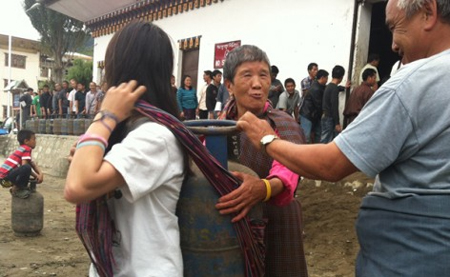
New Delhi, Jul 6: Is this a case of diplomatic overkill or just the slow grind of the bureaucratic machinery? Five days ago, India withdrew all subsidy on cooking gas and kerosene being provided to Bhutan - arguably India's only unquestioned friend among its neighbours - creating a huge crisis in the tiny, landlocked kingdom and bringing the bilateral ties under strain.
Gas and kerosene prices have more than doubled in Bhutan, and predictably, this will hit the poor the hardest. The head of the interim government, Sonam Tobgye, has written to external affairs minister Salman Khurshid, seeking his intervention. Government sources here confirmed that Bhutan embassy had sought an appointment with Khurshid, who landed in Delhi only on Friday afternoon after his trip to Brunei and Singapore, to deliver the letter.
The subsidy cut has come against the backdrop of New Delhi smarting since last year when Bhutan PM Jigme Thinley appeared to be cosying up to Beijing. He had a meeting with the Chinese premier in Rio and also imported some 20 buses from China. India, which has historically supported Bhutan's foreign policy, including its membership to the UN, was taken by surprise.
The Thinley government has since played down his meeting with the Chinese leader, but not everyone in New Delhi seems convinced about its purported innocence. In fact, the mandarins here view it as a shift in Thimpu's foreign policy - a shift that appears to have been done at the instance of the elected Thinley government. However, it couldn't be ascertained whether the subsidy cut was linked to this.
Sources in Indian Oil Corporation told TOI that it stopped supplying subsidized gas and kerosene to Bhutan after it received a communication from the Indian government saying that henceforth it will not reimburse the subsidy component of fuels supplied there.
The subsidy cut has come bang in the middle of Bhutan's second election, scheduled for July 13. How big the impact of this is can be measured by the fact that the incumbent Druk Phuensum Tshogpa (DPT) party president and the last prime minister, Jigme Thinley, has cut short his campaign and returned to Thimpu. His pitch is that helping out the poor was more important than electoral campaigning.
Is the subsidy cut a considered step or some bureaucrat's ill-advised enthusiasm? Officials here are suggesting that since the Bhutan 10th Plan expired on June 30, the fresh terms of financial assistance, including subsidies, would have to be negotiated with the new government.
As it happens, apart from the China angle, New Delhi has also been miffed at the cost escalation of power projects in Bhutan which it is financing. In some cases, the cost has almost doubled, raising suspicions of some fund diversion.
India's reservations about Bhutan's policies under Thinley is said to be a key reason why New Delhi reacted very late to bail out the kingdom from its rupee liquidity crunch. It extended a standby credit facility of Rs 1,000 crore for Bhutan only in January this year during the visit of Bhutan king Jigme Wangchuck with whom New Delhi continues to enjoy excellent relations.
So, was the subsidy cut an effort to convey a message to Thimpu, more specifically to the Thinley dispensation? If so, the medium for the message could have been better chosen. The one-go subsidy cut isn't an ordinary step: it has affected over half the Bhutan population badly. What's more, it has enabled Jigme Thinley to brandish his patriotic credentials and could end up helping him in the elections.
As is well known, India isn't exactly loved by its neighbours for its alleged big-brotherly attitude. The exception has been Bhutan, which is sandwiched between two giants, India and China. While the tall Himalayas lie between Bhutan and China, it has an open border with India, as well as free trade, access of markets and cultural affinity.
While the Thinley regime might have introduced a thorn in the warm ties, the one-shot cut in subsidy may not help in bringing back the warmth. On the contrary, it might end up fanning an anti-India sentiment among the people there. So, while New Delhi's concerns seem justified, greater thought is required to handle the emerging problem.





Comments
Add new comment